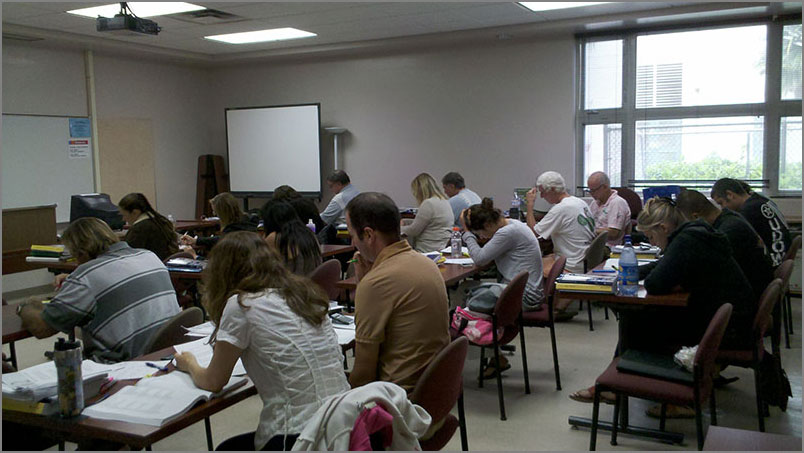What Courses Are Available at a Real Estate College? A Complete Overview for Aspiring Representatives
Ambitious property representatives have a diverse range obviously readily available to boost their expertise and skills. These offerings range from fundamental classes in property concepts to specialized training in locations like residential or commercial property monitoring and industrial real estate. Recognizing the various academic paths can be important for success. What essential subjects and techniques will these training courses cover, and just how might they shape an agent's job?
Understanding the Fundamentals: Property Concepts
The foundation of genuine estate understanding hinges on understanding its concepts. These concepts include essential concepts that govern the buying, selling, and monitoring of properties. Trick subjects include residential or commercial property ownership, land use, and the different legal rights related to possession. Recognizing the differences between property, commercial, and industrial residential or commercial properties is important, as each classification has unique market dynamics.
Additionally, pupils find out about market evaluation, which includes evaluating residential or commercial property values and patterns to make informed choices (Real Estate School). Property concepts likewise cover the importance of agreements and the lawful framework that supports property purchases. Experience with funding choices, such as finances and home loans, is crucial for guiding the economic aspects of realty. Generally, a strong understanding of these concepts furnishes ambitious representatives with the fundamental knowledge necessary to prosper in the affordable realty sector, leading the way for more specialized training and licensing

Licensing Demands and Exam Prep Work
Aspiring actual estate agents must browse details licensing demands to practice legitimately in their respective states. These needs commonly consist of finishing an assigned variety of hours in pre-licensing education, which covers essential subjects such as property law, principles, and residential or commercial property monitoring. Candidates need to additionally pass a state exam that examines their knowledge and understanding of these subjects.
Exam preparation is vital for success. Many property institutions use test prep courses that supply method concerns, research study guides, and evaluation sessions. These sources help candidates acquaint themselves with the exam style and content. Furthermore, signing up with study hall or making use of on the internet platforms can improve finding out via collective evaluation and discussion.
As soon as the exam is passed, representatives need to request their license through the state's real estate payment, commonly accompanied by background checks and costs. Meeting these licensing needs assures that representatives are outfitted to serve customers effectively and fairly in the property market.
Specialized Courses: Property Monitoring
Comprehending the complexities of home administration is necessary genuine estate professionals seeking to boost their knowledge in this customized area. Residential or commercial property administration training courses offer representatives with beneficial insights into the everyday procedures of managing business and household homes. These courses typically cover vital subjects such as occupant connections, lease arrangements, and home maintenance.
Additionally, striving residential property supervisors find out about monetary administration, including budgeting and rent collection techniques, as well as lawful responsibilities associated with lessee rights and property laws.
Programs might also explore marketing methods for drawing in renters and tools for home administration software that enhance operations. By completing specialized residential or commercial property administration training courses, genuine estate professionals can better outfit themselves to deal with the obstacles of managing buildings properly, eventually leading to enhanced customer contentment and service development. This understanding is crucial for those intending to stand out in the affordable realty market.
Industrial Property: A Different Viewpoint
Commercial genuine estate runs under unique market characteristics that identify it from homes. Comprehending financial investment approaches certain to this field is necessary for success, as is identifying the value of networking possibilities offered to professionals. These elements together form a comprehensive approach to going across the complexities of commercial genuine estate.
Distinct Market Characteristics

Financial Investment Techniques Described
Many investment techniques exist within the domain of business real estate, each tailored to meet certain financial goals and market conditions. One typical method is value-add investing, where financiers get underperforming homes, boost their value via improvements, and subsequently boost rental income. One more technique is core investing, focusing on maintained, top notch properties in prime locations that offer constant cash circulation. Additionally, opportunistic investing entails higher danger, targeting residential properties needing significant redevelopment or in arising markets. Realty investment counts on (REITs) use a more passive strategy, enabling people to purchase a varied profile of industrial buildings. Crowdfunding platforms have actually emerged, allowing little capitalists to engage in larger industrial deals, democratizing accessibility to the commercial real estate market.
Networking Opportunities Available
In the domain name of actual estate investing, building a robust expert network can considerably improve possibilities for success. Networking opportunities are plentiful at real estate institutions, where hopeful representatives can get in touch with industry specialists, trainers, and fellow students. Workshops, workshops, and visitor lectures often include knowledgeable representatives and brokers who share insights and experiences, providing indispensable calls. Numerous schools likewise promote neighborhood meetups and networking events, encouraging trainees to engage with the more comprehensive realty community. In addition, online platforms and discussion forums associated with these programs enable recurring interaction and collaboration. By leveraging these possibilities, students can foster relationships that might bring about mentorship, partnerships, and possible task placements, eventually aiding in their professional development within the affordable commercial property market.

Realty Financial Investment Methods
Realty financial investment techniques differ considerably, incorporating methods such as rental residential property investments, flipping homes, and engaging with Property Financial Investment Trust Funds (REITs) Each approach provides one-of-a-kind opportunities and dangers that capitalists have to very carefully consider. Understanding these alternatives is vital for anybody seeking to build an effective property profile.
Rental Home Investments
Lots of capitalists locate rental property financial investments to be an engaging method for constructing wide range and generating easy income. This technique this content entails buying property or industrial buildings to rent to renters, ensuring a steady capital. Successful rental property financial investments need comprehensive marketing research, evaluating home worths, and understanding neighborhood rental demand. Investors commonly take advantage of tax obligation advantages, such as depreciation and home loan rate of interest reductions. Furthermore, building monitoring skills are important for preserving lessee connections and guaranteeing prompt rental fee collection. Long-term admiration of residential or commercial property worths can further enhance a financier's profile. Overall, rental residential property financial investments can offer a stable income and add to economic safety and security, making them an attractive alternative for numerous in the property market.
Flipping Residences Techniques
Turning homes has actually emerged as a prominent method genuine estate capitalists seeking quick returns on their investments. This method involves buying undervalued homes, making required restorations, and offering them at a greater cost. Successful house flippers typically perform extensive marketing research to identify appealing areas and residential or commercial properties with potential for gratitude. They usually concentrate on cosmetic upgrades, such as kitchen and shower room remodels, to enhance charm without spending too much - Real Estate School. In addition, recognizing funding options and taking care of spending plans are necessary for making this hyperlink the most of revenues. Time is of the essence in this approach, as extended renovations can erode earnings margins. Inevitably, turning houses needs a mix of market understanding, renovation abilities, and economic acumen to be effective in an affordable realty landscape
REITs and Diversity
Although direct property financial investment can produce high returns, Real Estate Investment Company (REITs) use an engaging option that allows financiers to diversify their profiles without the intricacies of managing physical buildings. REITs are firms that possess, operate, or finance income-producing property throughout various sectors, consisting of residential, commercial, and industrial homes. By spending in REITs, individuals can obtain direct exposure to realty markets without the demand for considerable resources or direct management responsibilities. This investment lorry additionally supplies liquidity, as shares can be conveniently dealt on supply exchanges. In addition, REITs commonly pay returns, offering a routine earnings stream. Generally, incorporating REITs right into a portfolio can boost diversity and reduce risks related to traditional residential property financial investments.
Proceeding Education And Learning and Professional Growth
As the realty market evolves, specialists need to participate in continuing education and expert growth to remain affordable and informed. This ongoing knowing is vital for adjusting to modifications in laws, modern technology, and market patterns. Genuine estate institutions use numerous training courses developed to improve abilities and understanding, including advanced negotiation methods, property management, and advertising strategies.
Lots of states require qualified representatives to finish a set variety of continuing education and learning hours to keep their licenses. These programs usually cover basic subjects such as ethics, fair housing guidelines, and danger monitoring.
In addition, why not look here industry workshops and seminars give networking chances, allowing representatives to get in touch with peers and industry leaders. By joining these instructional programs, real estate specialists can ensure they stay competent and receptive to customer demands, inevitably resulting in career growth and success in a vibrant industry.
Frequently Asked Questions
What Is the Regular Duration of Real Estate Courses?
The regular duration of realty training courses varies, generally ranging from a couple of weeks to a number of months. Elements influencing this period include course web content, shipment approach, and state needs, impacting hopeful agents' instructional timelines.
Are Online Courses Available for Real Estate Education?
Yes, numerous online training courses are available genuine estate education. These programs give flexibility and availability, permitting individuals to learn at their very own rate while covering necessary subjects essential for obtaining realty licenses and understanding.
Exactly How Much Do Property Courses Typically Expense?
Property programs normally range from $200 to $1,500, depending on the institution and course size. Extra costs for products, exams, and state licensing might additionally apply, contributing to the general cost of education.
Can I Take Realty Courses Part-Time?
Yes, individuals can take property training courses part-time. Many schools supply flexible organizing choices, allowing hopeful representatives to stabilize their research studies with various other dedications, making it easily accessible for those with busy way of livings.
What Careers Can I Pursue After Finishing Realty Courses?

These offerings vary from foundational courses in actual estate principles to specialized training in areas like building management and business genuine estate. Actual estate concepts also cover the significance of contracts and the lawful framework that supports real estate purchases. While many real estate professionals focus on household markets, the characteristics of business actual estate existing unique difficulties and possibilities that call for a different strategy. Real estate financial investment strategies vary considerably, incorporating methods such as rental home financial investments, flipping homes, and involving with Real Estate Financial Investment Trusts (REITs) Straight home investment can produce high returns, Real Estate Financial Investment Trust Funds (REITs) supply an engaging option that enables investors to expand their portfolios without the complexities of taking care of physical residential or commercial properties.